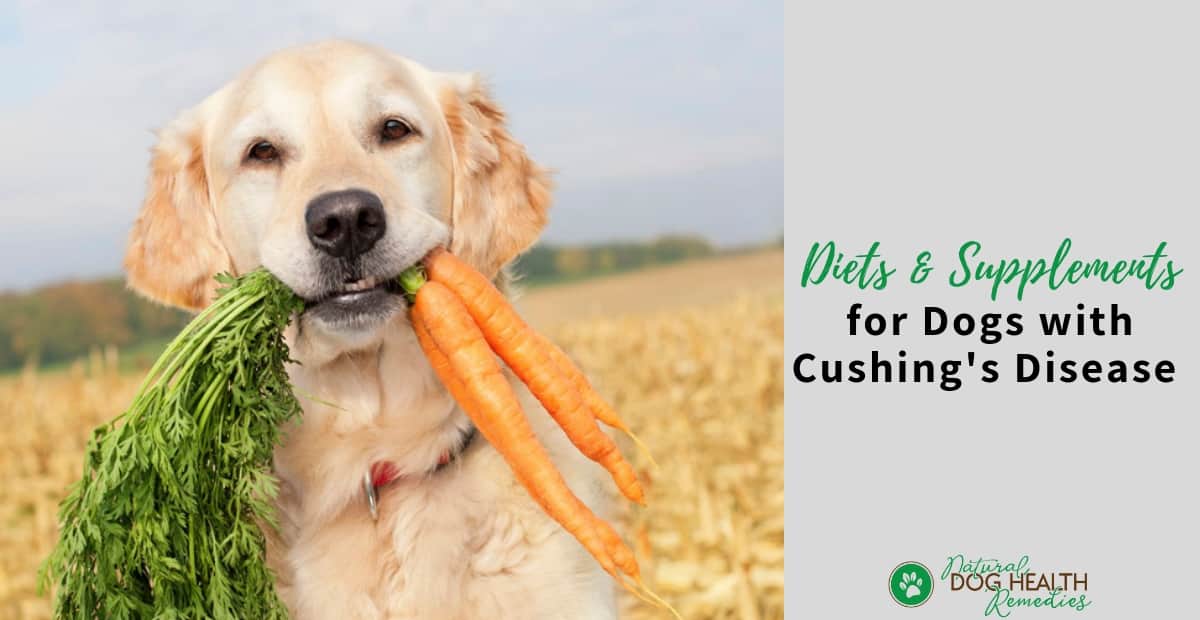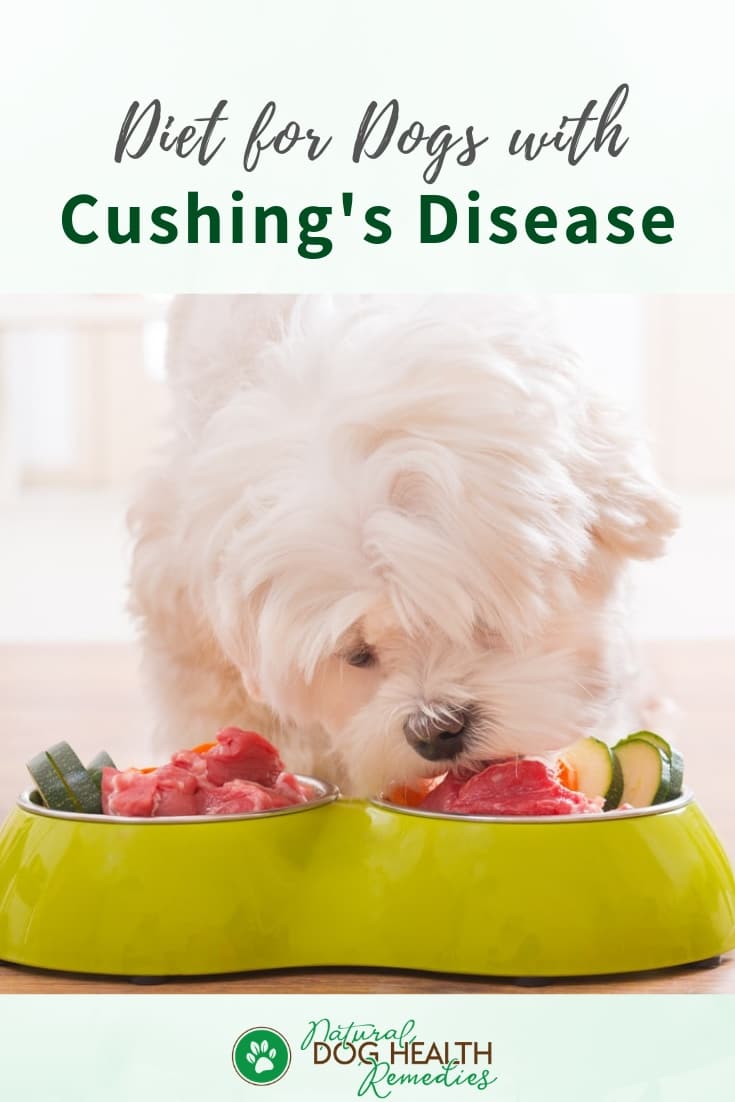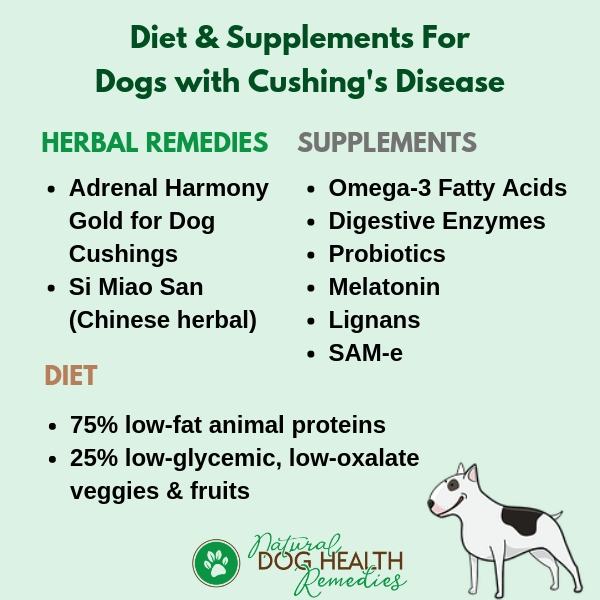Dog Cushings Diet and Remedies
(FTC Disclosure: If you make a purchase via a link on this page, I may receive a small commission, at no added cost to you.)

Overview
Dogs with Cushing's disease have, in their blood, an abnormally high concentration of the stress hormone cortisol for weeks and months.
The excessive amount of cortisol in the blood wreaks havoc to the dog's metabolism. It also has an adverse effect on the proper functioning of many system organs.
Conventional treatment of Cushing's disease in dogs is limited to drugs, and sometimes surgery. However, the drugs can cause potential side effects to the dog patients.
Although natural remedies and diet alone cannot cure Cushing's in dogs, they can greatly improve the quality of life and functioning of the affected body organs.
Diet for Canine Cushings Disease
If you can home cook for your dog, so much the better! Fresh ingredients (as opposed to processed food like kibbles) are wholesome and contain a lot more nutrients and enzymes, and are easier to be digested.
As a general rule of thumb, a Cushing's diet for dogs should be high in good-quality (human-grade) animal proteins (about 75% of the diet). The protein can strengthen the dog's muscle mass and immune system.
The remaining 25% of the diet can be vegetables and fruits.
As mentioned in this article, a dog with Cushing's is prone to a host of other health issues, including bladder stones, diabetes, and pancreatitis.
Therefore, when cooking for your dog with Cushings, remember these three basic rules:
- To avoid diabetes, the ingredients should be low-glycemic.
- To prevent bladder stones from forming, the ingredients should be low-oxalate.
- To prevent pancreatitis, the ingredients should be low-fat.
What ingredients fall into these categories? Let's take a look:
Low-Fat Animal Proteins
Low-fat protein sources include:
- chicken breast or turkey breast (skinless)
- lean ground beef
- venison
- rabbit
- scrambled eggs
- low-fat cottage cheese
- low-fat plain yogurt
Low-Glycemic & Low-Oxalate Ingredients
These food items are low-glycemic and low-oxalate and are safe for dogs:
- Vegetables: Broccoli, Brussels sprouts, carrots, cauliflower, cucumber, green peas, mushrooms, string beans, white cabbage, zucchini.
- Fruit: Apples (core and seeds removed), bananas, cantaloupe, watermelon.
- Fish: All fish (except sardines), shellfish.
- Dairy Products: Cheese, cottage cheese, eggs, yogurt.
To further prevent bladder stones from forming, make sure that your dog always has access to fresh clean water.
Feed frequent smaller meals (e.g. 3 to 4 times a day) to help reduce the burden on the digestive system.
Supplements for Dogs with Cushing's Disease
To help your dog with Cushing's fare better, give these dietary supplements:
Digestive Enzymes
This is an important supplement for dogs with Cushings, as a digestive enzyme supplement can greatly help to pre-digest fats. This can help reduce the burden on the pancreas, thus preventing pancreatitis from occurring.
Fish Oil
Fish oil (e.g. krill oil, salmon oil) is rich in anti-inflammatory Omega-3 fatty acids.
If you recall, dogs with Cushing's are also susceptible to quite a few inflammatory health issues (e.g. UTIs, skin inflammation, ear infections, heart and kidney problems, etc.)
By giving fish oil to a dog with Cushing's, we are helping the dog to fight inflammation.
Probiotics
If your dog is unfortunately already suffering from some form of infection (e.g. ear infections, UTIs), chances are he is on antibiotics. By supplementing probiotics to your dog, you are helping your dog to re-balance the gut flora in his digestive system.
Probiotics can also strengthen the GI tract, reducing the risk of infections and helping to boost the immune system.
Melatonin and Lignans
A document by The University of Tennesee College of Veterinary Medicine suggests that Melatonin can be used to help dogs with Cushing's disease.
However, it may take a while (up to 4 months) to see results, depending on the individual dog patient.
The University document also suggests using melatonin and lignans together for synergy.
Actually quite a few holistic vets have also said that lignans (e.g. flax hull lignans) can decrease cortisol levels in the body.
Dr. J. Oliver of the University of Tennessee says that lignans are safe and you don't even have to worry about about "correct dosage" when giving lignans to your dog.
SAMe
SAMe is a supplement which has antioxidant properties and may help dogs with Cushing's disease with liver complications.
Herbs for Dog Cushing's Disease
 Herbs cannot cure canine Cushings disease, but they can still be used to support the organs and systems that are put under extra stress due to the disease.
Herbs cannot cure canine Cushings disease, but they can still be used to support the organs and systems that are put under extra stress due to the disease.
For example, turmeric, milk thistle, burdock, and nettle are effective in strengthening an overtaxed liver, kidneys, and digestive system. The rich vitamins and minerals (especially potassium and magnesium) in these herbs can also replace those that are lost as a result of increased urination.
Immune-boosting tonic herbs such as astragalus or Siberian ginseng are also beneficial to strengthen the immune system.
A natural herbal formula that works well is Adrenal Harmony Gold for Dog Cushings (Affiliate link).
This herbal remedy contains herbs such as sarsaparilla, astragalus, milk thistle, turmeric, and more. It promotes healthy skin and coat and helps support proper muscle tone. It also reduces thirst and supports normal urination. Many dog parents have used this herbal remedy with very good results.
Traditional Chinese Medicine
TCM has been in use for thousands of years, and some herbs can be used to regulate the endocrine system.
For example, some holistic vets recommend the Chinese herbal formula Si Miao San (see below), which is best for overweight dogs with Cushing's disease. It regulates insulin level, decreases inflammation in the body, and improves digestion.
A word of caution: If you are treating your dog with both conventional medicine AND natural remedies (e.g. herbs), be sure to consult with your vet first as the natural treatments can change the amount of conventional meds needed to control Cushing's disease. Signs of overdose include appetite loss, lethargy, vomiting and/or diarrhea.
 References
References
R.H. Pitcairn, The Complete Guide to Natural Health for Dogs and Cats (Rodale, 2005).
L. Olson, Raw and Natural Nutrition for Dogs: The Definitive Guide to Homemade Meals (North Atlantic Books, 2010).
W.J. Dodds, D.R. Laverdue, Canine Nutrigenomics - The New Science of Feeding Your Dog for Optimum Health (Dogwise Publishing, 2015).





